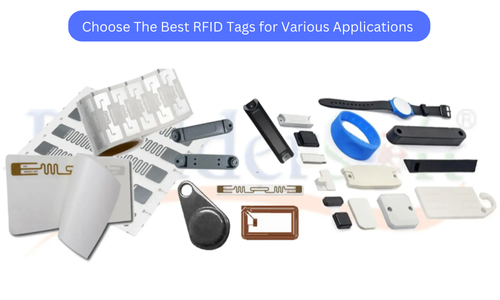
Radio Frequency Identification (RFID) technology is changing many industries by providing new solutions to old problems. RFID tags store and transmit data using radio waves and are crucial in retail, healthcare, and logistics. This article looks at how RFID tags are used in these industries through practical applications and real-world examples.
What is RFID Technology?
RFID technology confidently utilizes electromagnetic fields to automatically identify and track tags affixed to objects. These tags contain electronically stored information that can be read from a distance without requiring line-of-sight. RFID systems are comprised of three essential components: the RFID tag or chip, the RFID reader, and the RFID software:
- RFID Tags: These are small devices containing a microchip and an antenna. The chip stores unique data about the item, and the antenna transmits this data to RFID readers.
- RFID Readers: These devices emit radio waves and receive signals back from the tags. Depending on the application, they can be either handheld or fixed.
- RFID Software: This software processes the data collected by the readers and integrates it into the organization’s management system.
Types of RFID Tags
There are three main types of RFID tags, each suited for different applications:
- Passive RFID Tags
Passive RFID tags are definitively powered by the electromagnetic energy transmitted from an RFID reader, thus eliminating the need for an internal power source. These tags are small, inexpensive, and have a long lifespan, making them ideal for inventory management and asset tracking.
2. Active RFID Tags
Active RFID tags have their power source, usually a battery, which allows them to transmit signals over longer distances. These tags are larger and more expensive but are useful for tracking high-value items or assets over large areas.
3 . Semi-Passive RFID Tags
Semi-passive RFID tags, also known as battery-assisted passive (BAP) tags, have a small battery to power the microchip but rely on the reader to communicate. These tags are a hybrid between passive and active tags, offering a balance of range and cost.
There are some Examples of RFID Tags for Various Applications Uses –
These tags have various applications such as security, tracking, identification, access control, inventory management, warehouse management, process automation, and other customized solutions. They come in different types, including passive tags (without battery) and active tags (with in-built battery). These tags are commonly used for assets management, automotive component tracking, industrial manufacturing, and more.
- Tyre Tags
- Windshield Tags
- Railways Tags
- RFID Garment Tags
- RFID Jewelry Tag
- High Temperature Tag
- Mount on Metal Tags & Labels
- Hang Tags
- Library Tags
- RFID Active Tags
- RFID Electronic Seals
- Solar Tags
- Sports Timing Tags
- Nail Tags
- Bolt Tags
- High-Temperature PCB Tags
- Strip Tags
RFID Tags in Retail
The retail industry has embraced RFID technology to enhance inventory management, improve customer experience, and streamline operations.
Inventory Management
Retailers like Walmart and Zara use RFID tags to keep track of their inventory in real time. Each item is tagged, allowing for accurate and instant updates on stock levels. This reduces the time spent on manual stock checks and minimizes the risk of stockouts or overstocking.
Theft Prevention
RFID tags are crucial for theft prevention. Retailers embed tags in products to trigger alarms if items are removed from the store without being paid for. This deters theft and helps recover stolen goods.
Enhanced Customer Experience
Innovative retailers are using RFID-enabled interactive mirrors. When a customer brings a tagged item close to the mirror, it displays product details, available sizes, and styling suggestions. This integration enhances the shopping experience by providing instant, personalized information.
RFID in Healthcare
The healthcare sector has adopted RFID technology to enhance patient care, improve asset management, and ensure regulatory compliance.
Patient Tracking
Hospitals use RFID tags to track patients in real time. Patients are given wristbands with embedded tags, allowing healthcare providers to monitor their location and ensure timely care. This is particularly useful in emergencies where quick access to patient information can be life-saving.
Asset Management
RFID tags are attached to medical equipment and supplies to track their location and usage. This ensures that critical equipment is readily available and reduces the time staff spend searching for misplaced items. It also helps maintain accurate records for equipment maintenance and regulatory compliance.
Medication Management
RFID tags are used to monitor medication distribution, ensuring that patients receive the correct dosage at the right time. By implementing this, we can significantly reduce the likelihood of medication errors and greatly improve overall patient safety.
RFID in Logistics
The logistics industry relies heavily on RFID technology to optimize supply chain operations, enhance security, and improve tracking and visibility.
Supply Chain Optimization
RFID tags provide real-time visibility into the movement of goods throughout the supply chain. This allows logistics companies to monitor shipment status, reduce delays, and improve overall efficiency. With RFID, companies can quickly identify bottlenecks and take corrective actions to maintain smooth operations.
Enhanced Security
RFID tags enhance the security of goods in transit. Each tagged item is monitored from the point of origin to its final destination, reducing the risk of theft or tampering. In the event of a security breach, the RFID system can quickly identify compromised items and provide detailed information about their last known location.
Improved Tracking
RFID technology enables precise tracking of goods within warehouses. RFID readers placed at strategic locations automatically update the inventory system as items move through the facility. This eliminates the need for manual scanning and reduces human errors.
Conclusion
RFID technology is a game-changer across various industries, offering innovative solutions to improve efficiency, security, and customer satisfaction. From retail to healthcare and logistics, RFID tags are pivotal elements reshaping how industries operate, ensuring more streamlined, secure, and efficient processes. As technology continues to evolve, we can expect even more innovative uses of these tags in different industries, driving further advancements and benefits.







